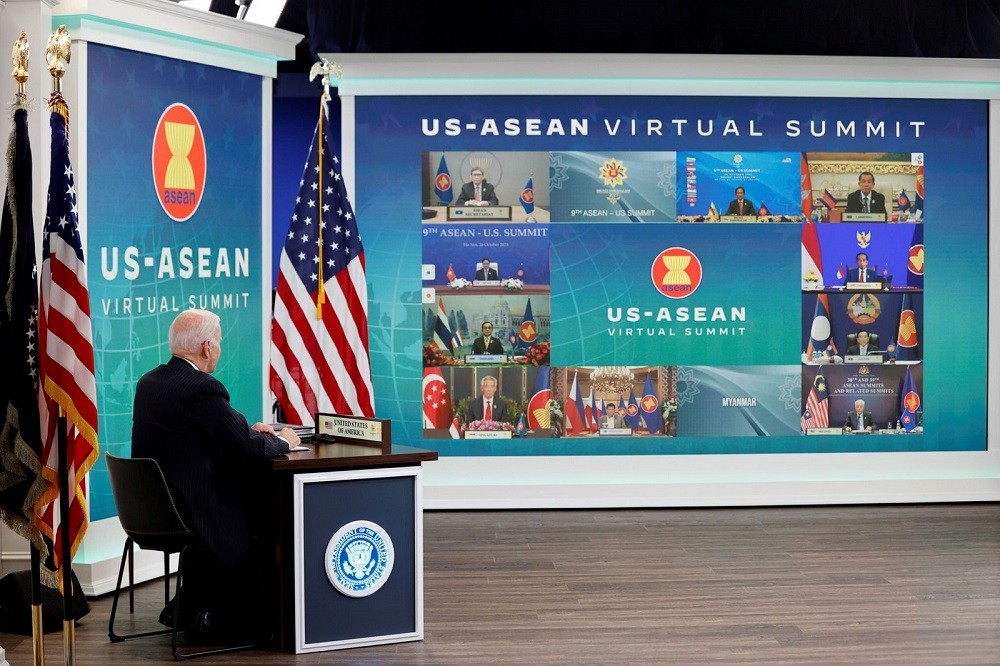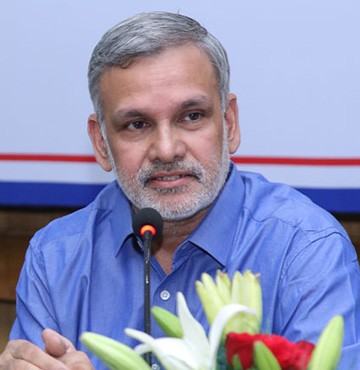
Expert: The ASEAN-US Special Summit will focus on ASEAN’s role in Indo-Pacific
Latest
 |
| US President Joe Biden during his virtual Summit with ASEAN Leaders on October 2021. (Source: AP) |
Dear Professor Chintamani, could you elaborate on the global, regional context prior to the US - ASEAN Special Summit. What key topics would be discussed during the Special Summit?
The special summit between the United States and ASEAN is going to take place in the backdrop of major turbulence in the global political, strategic and economic order.
The COVID-19 pandemic has disrupted global political economy for over last two years causing enormous hardships to companies, corporations, and even common people. Travel, tourism, entertainment industry, the hotel industry, educational exchanges and even official meetings between government leaders and agencies have created a complex set of problems that are not going to be normal any time soon. All countries of the world have been trying hard to restore normalcy. Nevertheless, the future does not seem optimistic at present.
The second event that has further made the world unstable and increasingly dangerous place is the Russia-Ukraine military conflict. Moscow argues that it has launched major military operations in view of the existential threat posed by the possibilities of Ukraine joining the North Atlantic Treaty Organization (NATO). NATO’s expansion to include Ukraine will bring American troops closest to the Russian border, contrary to the promises made by the US to Russian leaders.
The United States and its European allies, on the other hand, have condemned Russia’s so-called “special military operation” in Ukraine and called it a violation of the UN Charter and the principle of national sovereignty and territorial integrity of nation-states. As the military confrontation expanded and became more fierce, the US and its allies have imposed thousands of sanctions against Russia aiming at crippling the Russian economy.
The international community are not united in their views on the Ukrainian situation. The United States has been trying to influence as many countries as possible to back its position on the Russia-Ukraine military conflict. The Special Summit meeting convened by US President Joe Biden in Washington is taking place in the backdrop of the above global scenario.
The regional scenario is equally disturbing in the Indo-Pacific with China’s territorial expansion in the South China Sea ignoring the principle of national sovereignty. China has sought military control over islands that are disputed and the ASEAN has not been able to develop a unified position. The US has repeatedly called for freedom of navigation and opposed the illegal Chinese claims of sovereignty in the waters of the South China Sea and even in the East China Sea.
Tension on the Taiwan Strait due to Chinese military muscle-flexing has also caused tremendous stress in the Indo-Pacific. The US-China economic Cold War started by President Trump’s Administration and continuing under President Biden’s Administration have created dilemmas among the ASEAN member countries. The summit will thus have discussion points on Russia-Ukraine military conflict, Chinese assertiveness on the South China Sea and ASEAN’s role in maintaining peace and stability in the Indo-Pacific.
| The special summit between the United States and ASEAN is going to take place in the backdrop of major turbulence in the global political, strategic and economic order. |
The US had repeatedly emphasized the central role of ASEAN in its Indo-Pacific strategy and specifically, in the recent Indo-Pacific Economic Framework. What measures could both sides implement to further promote common interests in accordance to such documents? Should we expect any significant announcement from either the US or ASEAN?
In my opinion, the decision of President Trump’s Administration to walk out of TPP and the fact that President Biden’s Administration have not joined CPTPP have indicated that Washington is not showing adequate attention to economic cooperation in the regional context.
While China is playing an increasingly important role in the RCEP, the CPTPP, in the absence of the US participation, will not have sufficient weight as a grouping to promote trade and investment cooperation.
President Biden’s Administration floated the idea of the Indo-Pacific Economic Framework during the US-ASEAN summit in 2021 as a symbolic gesture to emphasize that the US would stay engaged in the Indo-Pacific region. Nevertheless, the details are not known. Therefore, it can be a major point of discussion.
In addition to that, China’s Belt and Road Initiative has moved into some difficult phases due to a lack of transparency and environmental consequences. President Biden’s Administration should be asked to offer credible alternatives with its active participation. It need not be against China, but it should be able to compete with China. ASEAN will greatly benefit from such healthy competition.
As an important member of ASEAN, what could Viet Nam do to contribute to US-ASEAN economic and security cooperation?
Although at the moment, President Biden’s Administration is too busy handling the Russia-Ukraine military conflict, COVID-19 pandemic and domestic economic issues, its leadership in providing alternative and reliable supply chains and trade opportunity alone can prevent any type of assertiveness and coercion in the region. As an important leader in ASEAN, Viet Nam can discuss this issue more intensely during the summit.
The US should also be persuaded not to expect ASEAN to support the US position on international affairs completely all the time. It is not always easy for ASEAN to have one voice on all political issues and thus, efforts should be made to continue building constructive ties between the US and ASEAN despite political differences on some issues, such as the Russia-Ukraine military conflict.
Professor Chintamani Mahapatra served as Pro Vice-Chancellor of a premier Indian university - Jawaharlal Nehru University (JNU). He is also the recipient of several prestigious fellowships, such as Commonwealth and Fulbright. He has authored or edited 8 books and several research articles. He specializes in American Studies, US foreign and National Security Policy, International Security, Asian Security and Globalization. |


















